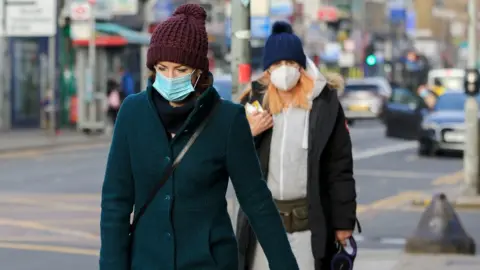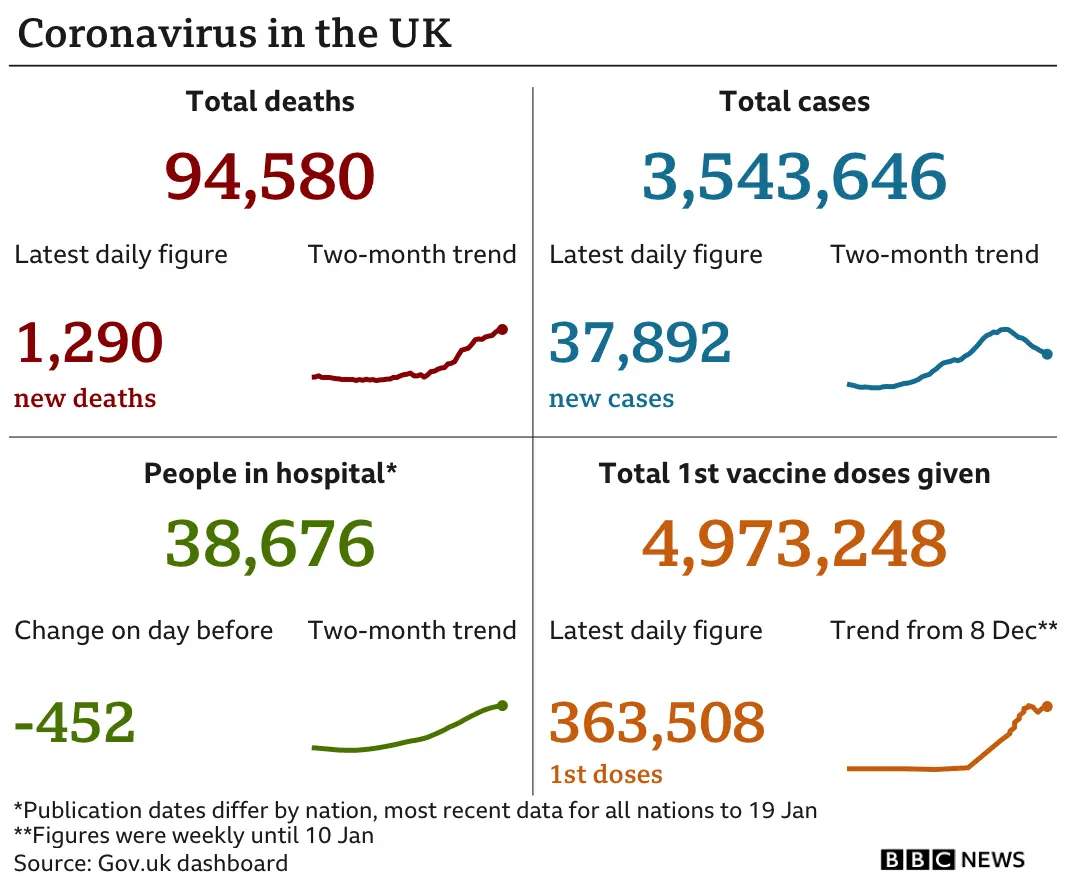Covid-19: No plans for universal £500 self-isolation payment, No 10 says
 Getty Images
Getty ImagesThere are no plans to pay everyone in England who tests positive for Covid £500 to self-isolate, No 10 has said.
The PM's official spokesman said there was already a £500 payment available for those on low incomes who could not work from home and had to isolate.
A universal £500 payment was among suggestions in a leaked Department of Health document.
There are fears the current financial support is not working because low paid workers cannot afford to self-isolate.
But a senior government source said the idea of extending the £500 payments to everyone who tests positive had been drawn up by officials and had not been considered by the prime minister.
BBC Newsnight's Katie Razzall said ministers were aware self-isolation was crucial for stopping the spread of coronavirus and the "options paper" had been drawn up by civil servants at the Department of Health.
She said it would be discussed soon by the Covid operations committee chaired by Cabinet Office minister Michael Gove, adding the move suggested there was an admission in government that too many people were not staying at home and a decision needed to be made quickly.
The story was first reported by the Guardian which said the options paper suggested the proposal could cost up to £453m per week - 12 times the cost of the current payouts.
Environment Secretary George Eustice told the BBC he had not seen the leaked document but said the issue of financial support for people self-isolating was "always kept under review".
"We've got to consider all sorts of policies in order to make sure that people abide by the rules, are able to abide by the rules and we get the infection rate down," he said.
But the prime minister's official spokesman denied the government was planning to introduce the new payment, telling reporters: "We've given local authorities £70m for the scheme and they are able to provide extra payments on top of those £500 if they think it necessary.
"That £500 is on top of any other benefits and statutory sick pay that people are eligible for."
Asked about document, the spokesman said he would not comment on a leaked paper.

Do people self-isolate?
By Ben Butcher, BBC Reality Check
It's impossible to say exactly what proportion of people stay at home for the full 10 days after being in contact with someone who has tested positive, however some evidence suggests the minority of people do.
A government-backed study from September 2020 suggests that just 10.9% of people remained indoors for the full time.
Labour has often cited this report when arguing that people cannot afford to miss work, but a closer look at it suggests that, of those who break the rules, just 8.9% do "to go to work".
Most people reported going out for things like shopping or exercise, but also because they didn't think they needed to quarantine as they didn't develop symptoms.
This research is quite old (done before self-isolation grants came in) and has a relatively small sample size of just 400 people.
However, the Scientific Advisory Group for Emergencies (Sage) has also highlighted research that shows that most people don't completely follow the rules.
This research also suggests that those on lower incomes felt they were three times less able to self-isolate than those better off.


BBC political correspondent Ben Wright said there was concern in government about the huge cost of the proposal for the Treasury.
However, he said the issue of financial incentives and trying to get people to self-isolate was clearly a live discussion within government.
It became a legal requirement last September for anyone in England testing positive for coronavirus to self-isolate.
The same level of payment is available in Scotland and Wales with similar conditions attached. Northern Ireland offers a discretionary self-isolation grant that covers expenses, such as the cost of groceries.
There is a list of specific criteria applicants must meet for the grant, but those who do not qualify for this payment and who are on a low income or may face financial hardship as a result of self-isolating can apply for a discretionary payment.
However, there have been high rejection rates for this discretionary grant in England, figures obtained by Labour and reported by the BBC this week suggest.
Between October and December last year, three-quarters of the 49,877 applications were rejected, the data showed.
Scotland's First Minister Nicola Sturgeon has said the Scottish government would welcome the introduction of a £500 payment, as the additional funds it would generate for Scotland could allow for a similar scheme to be set up.
Speaking at her regular coronavirus briefing, she said: "We will see whether that transpires or not, but any extra resources for self-isolation we would use to support self-isolation."
In other developments:
- The UK's R number - a measure of whether the epidemic is growing or shrinking - is at or below one for the first time since early December
- The prime minister is to lead a Downing Street coronavirus briefing at 17:00
- British retail sales saw their largest annual fall in history last year as the impact of the pandemic took its toll
- UK government borrowing hit £34.1bn last month, the highest December figure on record, as the cost of pandemic support weighed on the economy
- Almost five million people in the UK have now had their first dose of a coronavirus vaccine
- Northern Ireland's health minister has said it is unrealistic to expect all lockdown restrictions to be lifted on 5 March
- Compliance with most measures to stop the spread of Covid remains high, according to the latest ONS data, with 96% using a face covering and 93% avoiding physical contact when outside their home
- The proportion of adults only leaving home for work, exercise, essential shopping or medical needs is at its highest level since May 2020 (65%), and proportion of adults working from home at its highest level since June 2020 (45%)
Prof Susan Michie, an adviser on the government's Scientific Pandemic Insights Group on Behaviours, told BBC Radio 4's Today programme just 18% of people with symptoms were self-isolating for the full 10 days they were meant to.
She said financial support currently offered to people having to self-isolate was a "key weakness" of the government's pandemic strategy.
'I have a mortgage to pay'
Sharon, a cleaner from Kent, told the BBC if no money were to come in for two weeks she would not be able to afford to self-isolate.
"I have a mortgage to pay," she said.
"I can't even afford to heat my property at the moment because my wages were cut and that £500 payment would make all the difference. I would be able to self-isolate.
"It wouldn't be enough money, but it would help."

- PAY-PACKET SUPPORT: What do chancellor's plans mean for wages?
- LOCKDOWN LOOK-UP: The rules in your area
- SYMPTOMS: What are they and how to guard against them?
- LOOK-UP TOOL: How many cases in your area?

The DoH said it would not comment on a leaked paper but stressed it was incumbent on everyone to help protect the NHS by staying at home and following the rules at "one of the toughest moments of this pandemic".
A spokesman said £50m was invested at the time the Test and Trace Support Payment scheme launched and it was providing a further £20m to help support people on low incomes who need to self-isolate.
People who have tested positive for coronavirus and those considered at risk of having been exposed to it must self-isolate.
Other legal obligations to self-isolate in the UK include:
- If you have Covid symptoms
- If you live with someone who has tested positive for Covid
- If you live with someone who has Covid symptoms (unless they have a negative test)
- If you arrive in the UK from a country other than the Republic of Ireland
- If you are contacted by NHS Test and Trace to say you have been in close contact with someone who has tested positive




Would £500 be enough to help you to self-isolate? Please share your experiences by emailing [email protected].
Please include a contact number if you are willing to speak to a BBC journalist. You can also get in touch in the following ways:
- WhatsApp: +44 7756 165803
- Tweet: @BBC_HaveYourSay
- Upload pictures or video
- Please read our terms & conditions and privacy policy
If you are reading this page and can't see the form you will need to visit the mobile version of the BBC website to submit your question or comment or you can email us at [email protected]. Please include your name, age and location with any submission.
